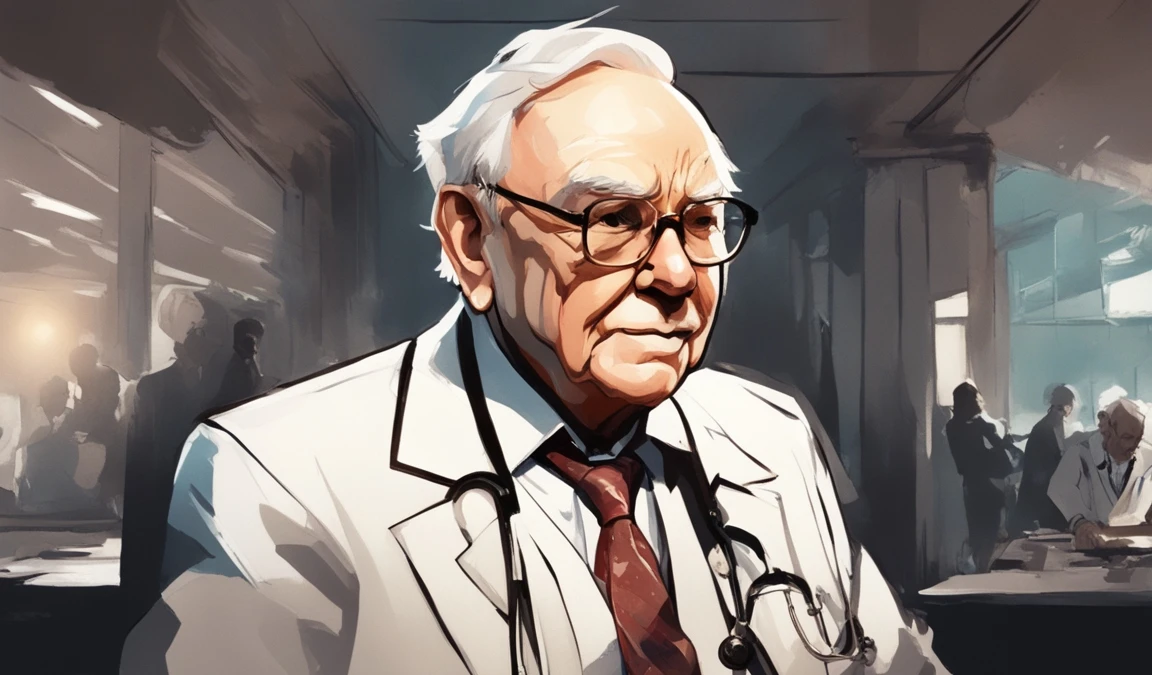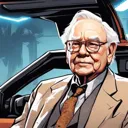Tags: History
This fanpage is not officially affiliated with Berkshire Hathaway: Disclaimer
Embark on an intriguing journey through the rise and fall of Haven Healthcare—a groundbreaking collaboration between industry giants Amazon, Berkshire Hathaway, and JPMorgan Chase. Discover the ambitious goals, strategic initiatives, challenges, and valuable lessons learned in the pursuit of healthcare innovation. Join us in exploring the untold story of Haven's impactful journey and its enduring legacy in transforming the U.S. healthcare system.

Introduction
In January 2018, a groundbreaking announcement shook the foundations of the U.S. healthcare industry. Haven Healthcare, a joint venture by three of the most influential companies in America—Amazon, Berkshire Hathaway, and JPMorgan Chase—promised to revolutionize healthcare for their employees, and potentially, for the entire nation. This ambitious initiative combined the technological prowess of Amazon, the financial acumen of Berkshire Hathaway, and the vast resources of JPMorgan Chase, under the leadership of industry titans Jeff Bezos, Warren Buffett, and Jamie Dimon 123.
The formation of Haven was not just a business venture; it was a bold statement against the complex challenges plaguing the U.S. healthcare system, including high costs, inefficiencies, and disparities in access to care 8910. With the U.S. healthcare debate as a backdrop, Haven aimed to leverage its unique position to address systemic issues head-on. The venture sparked significant attention and high expectations, reflecting the broader context of healthcare reform debates in the U.S. 7.
This article sets out to explore Haven's journey—from its formation and goals to its operations, challenges, and eventual dissolution. Despite its disbandment in February 2021, Haven's story offers valuable lessons and insights for future healthcare innovation efforts. As we delve into Haven's impactful journey, we will uncover how a collaboration between such diverse giants aimed to break boundaries and what this means for the future of healthcare innovation.
Background: The Healthcare Challenge
At the time of Haven's inception, the U.S. healthcare system was in a state of crisis. Despite being the world's largest economy, the U.S. lacked universal healthcare coverage, and its healthcare costs were skyrocketing. The system was characterized by its high costs, complexity, and the lack of universal coverage, making it an outlier among developed nations 89. The Affordable Care Act (ACA) of 2010 had made strides in expanding coverage and implementing reforms, but debates around healthcare policy and reform continued to rage 9.
Statistics painted a grim picture: the U.S. spent more on healthcare than any other country, both in absolute terms and as a percentage of GDP, yet it did not necessarily achieve better health outcomes 9. Here are some facts according to Wikipedia that put the enormous healthcare challenge into perspective 9:
- The US spends more on healthcare as a percentage of GDP compared to similar countries
- In 2016, the US spent $3.3 trillion on healthcare, with major categories being hospital care, physician and clinical services, and prescription drugs
- Aggregate US hospital costs were $387.3 billion in 2011, with costs per stay averaging $10,000
- Public spending accounted for between 45% and 56% of US healthcare spending in 2008
- The Health and Human Services Department expected healthcare spending to reach 19% of GDP by 2017
This urgency for innovative solutions was palpable. Employer-sponsored healthcare, which played a central role in the U.S. system, affected the lives of millions of employees, including those of Amazon, Berkshire Hathaway, and JPMorgan Chase. Rising costs for employers and employees alike were creating a financial strain, spotlighting the need for change 10.
The concept of disruptive innovation in healthcare was not new, but previous attempts had faced significant challenges. The broader context included technological and business model innovations in healthcare, yet the system's complexity and resistance to change had often stifled progress. Haven's mission was set against this backdrop, aiming to leverage the combined strengths of its founding companies to make a meaningful impact.
As we explore Haven's journey, it's essential to understand the enormity of the challenge it sought to address. The U.S. healthcare system's issues were deeply entrenched, affecting every aspect of care from access to affordability. Haven's ambitious goal to transform healthcare was a testament to the vision of its founders and the urgent need for systemic change.

The Formation of Haven
In a bold move that captured the attention of the healthcare industry and the public alike, Amazon, Berkshire Hathaway, and JPMorgan Chase announced the formation of Haven in early 2018. This not-for-profit venture was spearheaded by three of the most influential companies in America, with a shared vision articulated by Jeff Bezos, Warren Buffett, and Jamie Dimon. They envisioned a healthcare system that was liberated from the constraints of profit-making incentives and the burden of excessive costs—a vision that was both ambitious and altruistic 1.
Choosing Boston, Massachusetts, as its headquarters, Haven positioned itself at the heart of innovation and academic excellence. This strategic decision underscored the venture's commitment to leveraging cutting-edge research and technology to transform healthcare delivery 1.
The appointment of Atul Gawande as CEO of Haven was a statement of intent. Gawande, a renowned surgeon, writer, and public health researcher, brought a wealth of experience and a deep understanding of the healthcare system's complexities. His leadership was seen as pivotal in guiding Haven's strategy towards improving healthcare outcomes, enhancing satisfaction, and achieving cost efficiency for the employees of Amazon, Berkshire Hathaway, and JPMorgan Chase 1.
The initial goals of Haven were met with a mixture of excitement and speculation ↗. The healthcare industry, in particular, was keen to see how this new entity would navigate the challenges of improving care while reducing expenses. The founding companies committed significant funding and resources to the venture, signaling a substantial investment in healthcare innovation. This move was not just about creating immediate solutions but was also a significant commentary on the ongoing debates and reform efforts surrounding the U.S. healthcare system. The formation of Haven was a clear indication that these companies were not just waiting for change; they were stepping up to be catalysts for change themselves.
Strategic Initiatives and Partnerships
In its pursuit of transformative healthcare solutions, Haven quickly embarked on strategic initiatives and partnerships that underscored its innovative approach. One of the early moves was the partnership with Cigna and CVS Health's Aetna to offer health plans specifically designed for J.P. Morgan workers. This collaboration was a clear signal of Haven's commitment to rethinking healthcare delivery and insurance benefits, making them more accessible and affordable for employees 1.
Haven's approach to leveraging technology and data analytics was further exemplified by the hiring of Serkan Kutan as CTO. Kutan's expertise in technology was seen as a critical component in developing healthcare solutions that were not only innovative but scalable. This focus on technology was aligned with Haven's broader objectives of improving access to primary care, simplifying insurance benefits, and making prescription drugs more affordable 7.
The venture's strategic focus was not limited to internal innovations ↗. Haven understood the importance of integrating its solutions within the existing healthcare system, which necessitated forming partnerships with established healthcare providers and insurers. These collaborations were crucial in attempting to bridge the gap between innovative healthcare solutions and the traditional healthcare delivery model.
However, the journey was not without its challenges. The healthcare industry is notoriously complex and resistant to change, and Haven's ambitious initiatives were met with both interest and skepticism. The potential for scaling these solutions beyond the employees of the founding companies was a significant point of discussion among stakeholders. While the industry recognized the need for innovation and the potential impact of Haven's strategic direction, the path to widespread adoption and implementation of these solutions remained fraught with obstacles.
The strategic initiatives and partnerships undertaken by Haven were a testament to the venture's commitment to reimagining healthcare. By focusing on primary care, leveraging technology, and collaborating with existing players in the healthcare system, Haven sought to create a model that could potentially serve as a blueprint for the future of healthcare delivery. Despite the challenges, the venture's efforts provided valuable insights into the possibilities and limitations of innovating within the healthcare sector.

Challenges and Setbacks
The journey of Haven Healthcare, a bold initiative by Amazon, Berkshire Hathaway, and JPMorgan Chase, was fraught with challenges and setbacks that ultimately led to its untimely dissolution. One of the most significant internal challenges was the departure of Dr. Atul Gawande, who stepped down as CEO but remained on the board, signaling a period of instability and high turnover of executives 17. This leadership turbulence hinted at deeper issues within the organization, affecting its strategic direction and operational efficiency.
Haven also faced considerable difficulties in gaining sufficient market share and competing with established healthcare players. The healthcare industry, known for its complexity and regulatory hurdles, proved to be a formidable battleground for Haven, which aimed to innovate and simplify healthcare services 1. The COVID-19 pandemic further exacerbated these challenges, diverting Haven's strategic focus and resources, and highlighting the monumental task of transforming healthcare in the midst of a global health crisis 1.
The unclear purpose and hazy goals of the joint venture were additional contributing factors to its struggles. Despite the initial excitement and potential for change, Haven struggled to define a clear and coherent strategy that resonated with its target audience and stakeholders. This lack of direction made it challenging to execute its mission effectively 1.
Moreover, the inherent challenges of innovating within the complex, regulated U.S. healthcare system cannot be overstated. The U.S. healthcare landscape is characterized by entrenched interests, competitive dynamics, and a multitude of stakeholders, making it difficult for new entrants like Haven to implement broad changes 6. These challenges underscore the broader implications for other companies and organizations attempting to innovate in healthcare, highlighting the need for clear goals, strategic focus, and resilient leadership.
The Dissolution of Haven
In February 2021, less than three years after its ambitious launch, Haven Healthcare announced its shutdown 1. The reasons provided for the dissolution were multifaceted, including the decision of the founding companies to pursue their healthcare projects separately 5. This decision reflected a recognition of the immense challenges Haven faced and the realization that each founding company could potentially be more effective by implementing their ideas independently.
The impact of Haven's closure on the healthcare industry was notable, with shares of healthcare companies rising after the news of its dissolution. This reaction from the market underscored the significant expectations placed on Haven to disrupt healthcare and the disappointment that followed its inability to achieve its lofty goals 5.
The disappointment and unmet expectations extended beyond the healthcare community to the employees of the founding companies. Many of Haven's 57 workers were expected to be placed at Amazon, Berkshire, or JPMorgan, and certain pilot programs initiated by Haven were set to continue within these companies 7. This transition aimed to salvage some of the innovative efforts and insights gained during Haven's operation.
Statements from the founding companies' leaders post-dissolution reflected a mixture of reflection and forward-looking optimism. Despite the setback, there was a consensus on the value of the lessons learned and the continued commitment to exploring healthcare innovation 6. Jamie Dimon of JPMorgan Chase emphasized the ongoing investment in healthcare innovation, despite Haven's disbanding, highlighting the enduring belief in the potential for transformative change in the healthcare sector 6.
The broader implications of Haven's dissolution for the future of collaborative healthcare innovation efforts are significant. Haven's journey underscores the challenges of aligning goals among diverse stakeholders, navigating the complexities of the healthcare system, and maintaining a clear strategic focus amidst changing leadership and external pressures. As the healthcare landscape continues to evolve, the lessons learned from Haven's ambitious but ultimately unsuccessful endeavor will inform future initiatives aimed at transforming healthcare.
Lessons Learned and Future Directions
The journey of Haven Healthcare, though shorter than anticipated, has left an indelible mark on the landscape of healthcare innovation. The venture's ambition to transform the U.S. healthcare system was met with significant challenges, yet it has provided invaluable lessons for Berkshire Hathaway, Amazon, JPMorgan Chase, and the broader healthcare industry. The dissolution of Haven is not an end but a pivot towards new directions and strategies in tackling the complexities of healthcare.
One of the key lessons from Haven's experience is the critical importance of having clear and aligned goals among partners. The triad of Berkshire Hathaway, Amazon, and JPMorgan Chase brought together a wealth of resources and expertise. However, the diversity in their core businesses and interests may have contributed to unclear objectives and challenges in aligning their healthcare strategies. This underscores the need for any collaborative venture to establish clear, shared goals from the outset.
Another lesson is the understanding of market power and its limitations. Despite the significant influence and resources of Haven's founding companies, they encountered formidable challenges in navigating the entrenched interests and complexities of the U.S. healthcare system. This highlights the difficulty of disrupting established industries and the necessity of building strong coalitions and partnerships with existing players to effect meaningful change.
The experience of Haven also brings to light the systemic challenges within the U.S. healthcare system, including perverse incentives and the resistance to change from entrenched players. The venture's struggles underscore the need for systemic reforms that address these underlying issues. As Dr. Atul Gawande pointed out, a greater investment in public health and a commitment to ensuring universal healthcare coverage are essential for strengthening the industry and preparing for future challenges 46.
Despite Haven's closure, the commitment of Amazon, Berkshire Hathaway, and JPMorgan Chase to healthcare innovation remains undiminished. JPM CEO Jamie Dimon's statement that they will continue to invest in healthcare innovation reflects a recognition of the ongoing challenges and opportunities within the sector 6. The lessons learned from Haven's journey are informing their future strategies and investments in healthcare.
Looking forward, there is significant potential for future collaboration and innovation in healthcare among the founding companies and other industry players. The insights gained from Haven's venture can inspire new models of healthcare delivery and financing that are more aligned with the needs of patients and the realities of the healthcare system. These models could leverage technology, data analytics, and patient-centered design to improve outcomes and reduce costs.
The involvement of the federal government and policy reform is also crucial in enabling healthcare innovation. Haven's experience has highlighted the limitations of market-based solutions in the face of systemic challenges. A "public option" based on Medicare Advantage plans, as suggested by Haven's leadership, could provide a framework for more sustainable and equitable healthcare solutions 4.

Conclusion
The journey of Haven Healthcare, a collaborative venture between Amazon, Berkshire Hathaway, and JPMorgan Chase, stands as a testament to the ambition, challenges, and ultimate dissolution of a groundbreaking attempt to innovate in the U.S ↗↗. healthcare system. The formation of Haven was marked by high expectations and a shared vision to revolutionize healthcare delivery for their employees and potentially for the nation. The unique collaboration between these corporate giants sparked significant interest and optimism, reflecting the urgency for change in the complex healthcare landscape.
Despite its strategic initiatives, partnerships, and the appointment of renowned leaders like Atul Gawande, Haven faced formidable challenges and setbacks that ultimately led to its dissolution in February 2021. Internal struggles, leadership turnover, market complexities, and the impact of the COVID-19 pandemic all played a role in Haven's inability to achieve its ambitious goals. The venture's closure highlighted the systemic issues within the U.S. healthcare system and the difficulty of disrupting established industries.
The lessons learned from Haven's journey are invaluable for future healthcare innovation efforts. Clear and aligned goals, market power limitations, systemic reforms, and collaborative innovation emerged as key takeaways from Haven's experience. Despite the venture's closure, the commitment of the founding companies to healthcare innovation remains steadfast, with a continued focus on exploring new strategies and investments in the sector.
Looking ahead, there is significant potential for future collaboration and innovation in healthcare, leveraging the insights gained from Haven's venture. The call to action for all stakeholders in the healthcare ecosystem is clear: continued innovation, collaboration, and systemic reform are essential for driving meaningful change and improving healthcare outcomes, efficiency, and equity. Shareholders of Berkshire Hathaway and the broader community are encouraged to remain engaged and supportive of efforts to transform the U.S. healthcare system for the better. The legacy of Haven Healthcare serves as a reminder of the challenges and opportunities inherent in healthcare innovation and the ongoing pursuit of a healthier future for all.
References
-
Jamie Dimon - Wikipedia - en.wikipedia.org ↩
-
Jeff Bezos - Wikipedia - en.wikipedia.org ↩
-
Why Haven Healthcare Failed - hbr.org ↩↩
-
Haven, the Amazon-Berkshire-JPMorgan venture to disrupt health care, is disbanding after 3 years - www.cnbc.com ↩↩
-
Why Berkshire Hathaway's health care project Haven failed - finance.yahoo.com ↩↩↩↩↩
-
Amazon’s Haven Healthcare Venture To Shut Down - www.forbes.com ↩↩↩↩
-
Healthcare in the United States: The top five things you need to know - health.mit.edu ↩↩
-
Healthcare in the United States - Wikipedia - en.wikipedia.org ↩↩↩↩↩
-
Is our healthcare system broken? - Harvard Health - www.health.harvard.edu ↩↩












